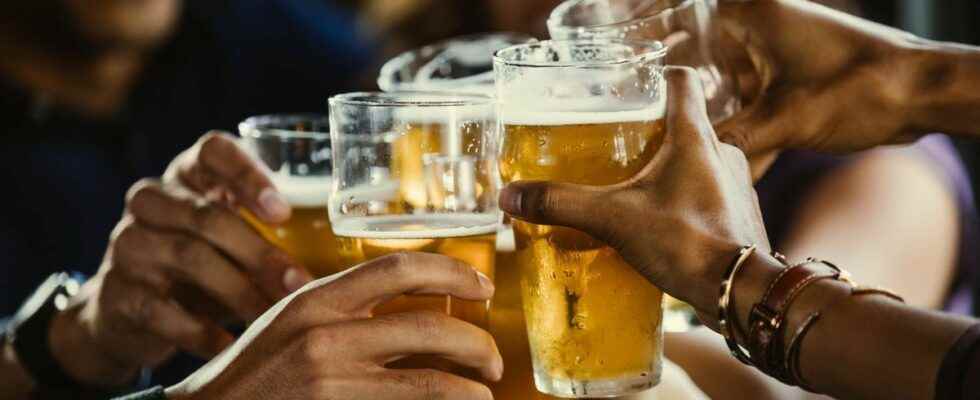Posted 20 hours ago,
Reading 3 mins.
Quantity of alcohol consumed per week, drinking habits, social pressure: the new report from Public Health France on alcohol consumption, published on June 1, reports that this drink is still too prevalent in the daily lives of French.
Too often normalized, even internalized, alcohol consumption is the second cause of avoidable death in France. In its new survey, the French public health agency sheds light on the relationship of the French to alcohol, which is still very strong. The opportunity to recall the risks associated with its consumption.
Towards the denormalization of alcohol consumption
According to Public Health France, alcohol still occupies an important place in the daily life of the French. According to the Health barometer 20171 out of 2 French people thought that offering alcohol or drinking it was part of the rules of etiquette.
“Without denying the friendly aspect it can have, it is necessary to realize that alcohol is harmful to health, that it is not automatic and that its consumption should not be trivialized”explains the report.
Prevention is essential on the medium and long-term risks of this “dope” – a term that is too rarely associated with alcohol – since the latter are “still minimized by the French”, can we read. In addition, the environment associated with alcohol remains “very favorable to its consumption (high exposure to advertising, high accessibility to the product, social pressure)”deplores the organization.
Alcohol: maximum 2 glasses per day, and not every day
In 2020, 23.7% of the population aged 18 to 75 exceeded the alcohol consumption benchmarks, according to the Barometer of Public Health France. These risky consumptions are more the fact of men (33.5%) than women (14.9%).
In 2019, new alcohol consumption benchmarks were enacted as part of the 4th National Health Nutrition Program (PNNS). The recommendations are as follows: maximum 10 glasses per week, maximum 2 glasses per day, and days in the week without consumption.
“These benchmarks now allow the French to make an informed choice of consumption with less risk to their health, knowing that the health risks of alcohol consumption exist from the first glass”argues Public Health France.
Prevention and detrimentalization actions
The data collected is worrying. This is why Public Health France is working to denormalize alcohol consumption, in particular through its national prevention actions adapted to different audiences (awareness campaigns aimed at young people “friends also at night” or with pregnant women “as a precaution: zero alcohol during pregnancy”) and its social marketing actions.
In November 2021, the organization published 4 videosin partnership with influencer Fabien Olicard, with a concrete objective: to change the perception of French people about alcohol to encourage them to question their own consumption.
The principle of the videos is simple: invited Youtubers react to the “amount” of alcohol they consumed in a week. Through their reactions, they address different themes related to alcohol: social pressure, the inability to say “no” to consumption, the automaticity of drinking alcohol, etc.
“The objective for Public Health France is to reduce the morbidity and mortality associated with the consumption of alcohol in France, by reducing the proportion of French people who consume beyond the benchmarks of consumption at lower risk”underlines the health agency.
Consult a GP online
A new tool to assess consumption
More recently, a tool has been set up to “assess your alcohol consumption and the risks involved”, explains Public Health France. It’s a new alcoholmeter who “allows, from a few questions, to evaluate one’s weekly alcohol consumption with regard to the new benchmarks and to estimate the risks associated with this consumption”.
This tool is available from the home page of the site www.alcohol-info-service.fr which also offers information, forums for discussion and remote assistance services.
